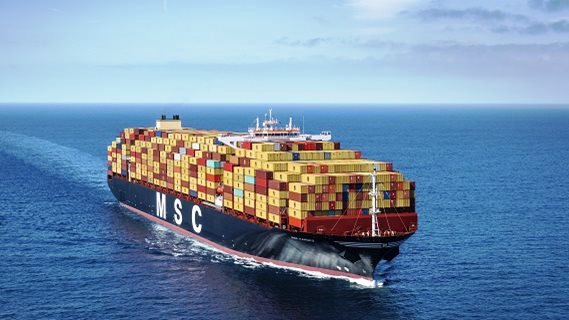Shipping Titan MSC Poised to Dominate Global Terminal Operations with $22.8B Hutchison Ports Acquisition
MSC's $22.8 billion acquisition of an 80% stake in Hutchison Ports Holdings cements its position as the top global terminal operator, expanding to 43 terminals with 100M+ TEU potential throughput. Backed by Blackrock-TiL, the deal includes Panama Ports Company, drawing U.S. scrutiny over Chinese influence. Drewry warns of competition risks in Panama, Europe, and Spain, with a lengthy regulatory review expected. The article covers market reactions, historical context, and MSC’s logistics ambitions.
LOGISTICS
Teresa Ndlovu
3/7/20254 min read


In a transformative move reshaping the global maritime industry, Hong Kong-based CK Hutchison has agreed to sell its 80% stake in Hutchison Ports Holdings to a consortium led by Blackrock and Terminal Investment Limited (TiL), a subsidiary of Mediterranean Shipping Company (MSC). Valued at $22.8 billion, this deal—the largest ever in the container terminal sector—positions MSC, already the world’s leading ocean carrier, to become the top global terminal operator, surpassing competitors in scale and influence, according to an in-depth analysis by maritime consultancy Drewry.
Announced in early 2025, the transaction includes Hutchison Ports’ extensive portfolio of 43 maritime container terminals outside China and Hong Kong, spanning regions from Australia to the United Arab Emirates. This network boasts a combined capacity exceeding 73 million twenty-foot equivalent units (TEU) and a throughput of nearly 47 million TEU in 2023. A standout component of the deal is the sale of Hutchison Port Holdings’ 90% stake in Panama Ports Company, which operates the strategic Balboa and Cristobal ports at either end of the Panama Canal—a critical chokepoint for global trade.
Strategic Implications
The acquisition comes at a time of heightened geopolitical tension over control of maritime infrastructure. Since December 2024, U.S. President Donald Trump has intensified scrutiny of alleged Chinese influence over the Panama Canal, accusing foreign operators of discriminatory practices against American shipping interests. Panama’s government has categorically denied these claims, asserting its sovereignty over the canal and its operations. The inclusion of Panama Ports in this deal is likely to amplify these concerns, given MSC’s impending dominance and TiL’s existing stakes in the region, including a 50% share in the Rodman terminal near Balboa.
Drewry’s Lead Analyst for Ports and Terminals, Eleanor Hadland, notes, “The proposed deal catapults MSC to the forefront of Drewry’s annual global terminal operator (GTO) rankings, securing the Swiss-headquartered carrier an unparalleled network of container terminals worldwide.” MSC’s current portfolio—encompassing a 70% stake in TiL, full ownership of Africa Global Logistics, and multiple Italian terminals via Marinvest—already processed over 70 million TEU in 2023. With Hutchison’s assets, MSC’s throughput could approach or exceed 100 million TEU annually, dwarfing rivals like APM Terminals and DP World.
A Deeper Dive into the Deal’s Footprint
The acquisition amplifies MSC’s presence in key markets, raising potential competition concerns. Drewry’s analysis highlights several hotspots:
Panama: TiL’s existing interests, combined with Hutchison’s Balboa and Cristobal operations, could give MSC near-total control over container handling at the Panama Canal, a vital artery for U.S.-Asia trade. This concentration may trigger regulatory pushback from American and regional authorities.
Northwest Europe: In Rotterdam, Europe’s busiest port, the deal could shift competitive dynamics, as MSC’s expanded footprint challenges operators like APM Terminals and Eurogate.
Spain: Both MSC and Hutchison already operate significant terminals in ports like Valencia and Barcelona, potentially leading to market consolidation that attracts scrutiny from EU regulators.
Beyond these regions, the deal bolsters MSC’s reach in emerging markets, including Southeast Asia (e.g., Thailand’s Laem Chabang terminal) and Africa, where its ownership of Africa Global Logistics complements Hutchison’s assets.
Blackrock’s Role and Historical Ties
The Blackrock-TiL consortium underscores a decade-long partnership between MSC and Global Infrastructure Partners (GIP), acquired by Blackrock in 2024 for $12.5 billion. GIP first invested in TiL in 2013, securing a 35% stake that has since adjusted to 20%, fueling TiL’s growth into a terminal powerhouse. This deal leverages that synergy, with Blackrock’s financial muscle and GIP’s operational expertise enhancing MSC’s bid. Industry insiders speculate that Blackrock’s involvement could also signal broader infrastructure investment trends, as institutional capital increasingly targets logistics amid global supply chain disruptions.
Regulatory Hurdles and Market Reactions
“This deal is a major win for MSC, locking in additional capacity in strategic markets,” Hadland concludes. “However, we anticipate a regulatory review process stretching at least 12 to 18 months, with competition authorities zeroing in on Northwest Europe, Spain, and Panama.” The U.S. Federal Maritime Commission (FMC) and the Committee on Foreign Investment in the United States (CFIUS) may examine the Panama angle, while the European Commission’s antitrust division is expected to assess impacts on intra-European trade.
Market reactions have been mixed. MSC’s rivals, including Maersk and COSCO, have remained tight-lipped, though analysts predict counter-strategies, such as accelerated terminal investments or alliances. Shares of CK Hutchison rose 4% on the Hong Kong Stock Exchange following the announcement, reflecting investor confidence in the deal’s valuation, while shipping stocks broadly ticked upward amid optimism over industry consolidation.
MSC’s Ascendance
Founded in 1970 by Gianluigi Aponte, MSC has evolved from a modest operator into a shipping juggernaut, commanding a fleet of over 800 vessels and a capacity exceeding 6 million TEU as of early 2025—nearly double that of its closest competitor, Maersk. Its terminal ambitions align with a broader strategy to integrate ocean freight, inland logistics, and port operations, mirroring the vertical integration seen in tech giants like Amazon. The Hutchison acquisition accelerates this vision, cementing MSC’s role as a linchpin in global trade.
What’s Next?
As of March 07, 2025, the deal awaits approvals from multiple jurisdictions, with initial filings expected in Q2. Stakeholders anticipate intense lobbying from U.S. and European interests, particularly over Panama, where Trump’s rhetoric could spur Congressional action. Meanwhile, MSC is reportedly eyeing further expansion in digital logistics, leveraging its terminal network to optimize real-time cargo tracking—a move that could redefine supply chain efficiency.
For now, the maritime world watches as MSC, once an underdog, solidifies its claim as the unrivaled titan of shipping and terminals—a shift that could ripple across global commerce for decades.
Future
© 2025. All rights reserved.


